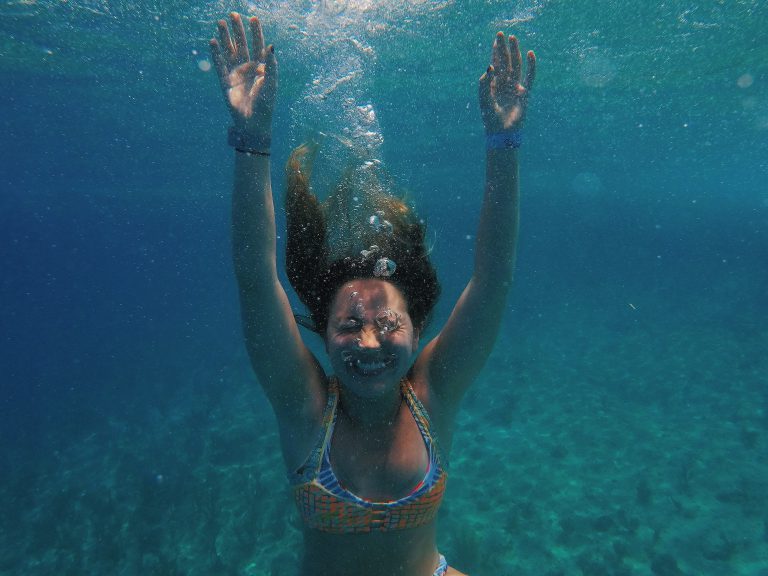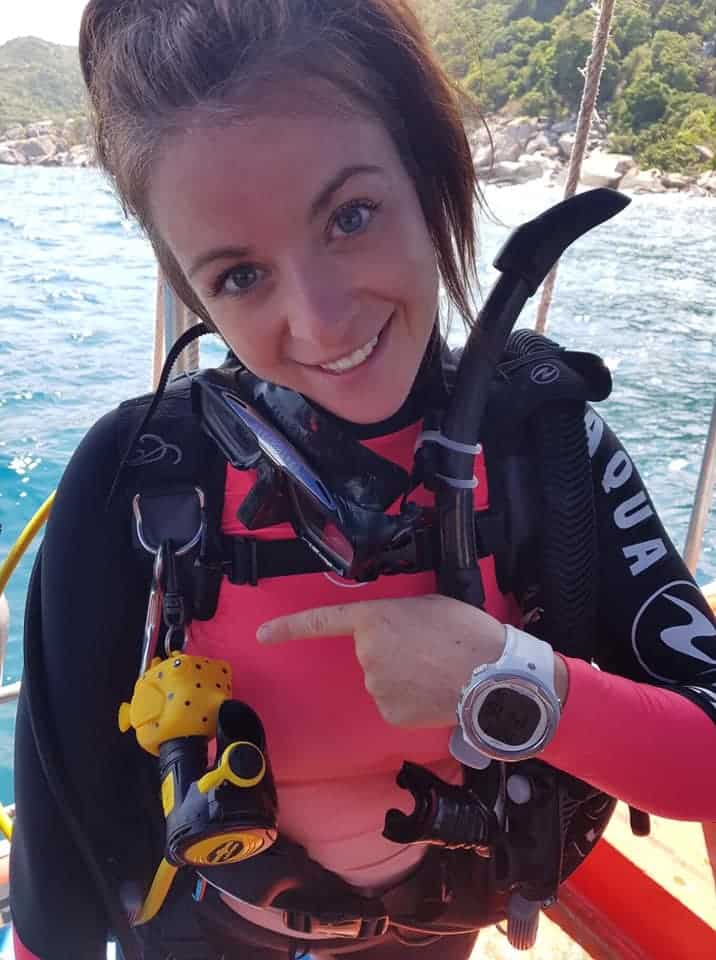If you have ever been diving, surfing or swimming in open water before, you might have wondered what it’s like to see beneath the surface.
I’ve been there! All divers have thought, ‘can I open my eyes underwater’ at one point or another. ‘I wonder what I’ll be able to see beneath the waves?’ It is a question that a lot of beginner scuba divers ask.
Of course, if you’ve got a good dive mask or pair of eye goggles for swimming handy, there’s no need to wonder!
However, there is actually a fair amount of misinformation out there about opening your eyes underwater. Can sea water harm you if you open your eyes when you dive and have to remove your mask?
In this quick guide, I’ll take a look at everything you need to know. Whether in the open ocean or a chlorine pool, there’s lots for you to see.
Table of Contents
Can I Open My Eyes in the Ocean?

Yes, it is safe to open your eyes underwater.
Providing the ocean water you are swimming in is clean, you shouldn’t have anything to worry about.
However, I would always recommend that you rinse your eyes carefully after swimming and opening your eyes underwater.
This is because oceans can carry nasty bacteria and could cause eye infections. However, in my experience, I’ve had a little bit of irritation from time to time, but that’s normally thanks to the sodium.
Just as you’d expect saline solution to sting and blur your vision a little when you clean your eyes, the same applies to open water.
It is something you will normally acclimatise to over time. However, always make sure to rinse yourself when on dry land.
If you wear contact lenses whilst diving or swimming, I would really recommend not opening your eyes underwater. For two reasons really, the first being that your lenses could get swept away and the second being that some of the nasty bacteria could get stuck behind them and cause an infection.
If you are a glasses or contact lens wearer, please check out my guide to masks for glasses wearers for more details!
Is Salt Water Safe for Eyes?
Salt water is safe for eyes for short periods, and as mentioned, you may sometimes use saline solution in everyday life.
However, if you have sensitive eyes, you may find that they sting. If you are in a lot of pain, don’t keep swimming or diving! Even if you can see, pain is a good sign that you should stop, even if you are in a pool with chlorine.
Salt can actually be really good for your eyes if you are cleaning them. Saltwater is a natural remedy for treating some eye infections, for example.
However, that doesn’t mean going for a swim with your eyes open will make you immune to infection. This is why there are some saltwater pools mixed with chlorine.
Again, if you are really worried, one of the best things you can do is swim with goggles on and of course, if diving, keep water in your mask to a minimum. There are some great mask designs on the market that fit so well that it’s very difficult to let water enter and they make clearing water from your mask super easy. There’s no real reason to keep your eyes closed. Find out more about what’s available by reading my Best Dive Masks Review and Guide 2024.
What Happens if You Open Your Eyes in Salt Water?

When you open your eyes in the ocean, you may feel temporary discomfort and stinging.
However, this will pass. While many people never open their eyes in the water for fear of infection or discomfort, there are actually plenty of benefits to opening your eyes right away.
For example, you may find it useful to open your eyes without a mask in the water if you are starting scuba diving for the first time. This is because there will be occasions, later on, when you need to take your mask off! However, don’t worry too much as the skill that requires you to remove and replace your mask underwater can be completed with your eyes closed. Just remember to let your dive instructor know beforehand that you do not feel comfortable opening your eyes with your mask off.
The discomfort is temporary, and you shouldn’t have anything to worry about. I had plenty of questions about this when I first started, too. The fact is, things will be blurry at first, but then clear up.
You just need to get through that initial stinging and providing you rinse well at the end of your diving session, you likely won’t have to worry about infection. Blurry vision is something that might even improve the more you go swimming underwater. The more you get used to the vision, the easier it will get to adjust your eyes, whether in a chlorine pool or out in the open water.
How Do You Open Your Eyes in Salt Water?
Make sure to open your eyes slowly without flooding them right away.
If it is your first time opening your eyes underwater, you should start with a careful squint. It could even be a good idea to open one eye, and then the other.
What you might find is that you are unable to open both eyes fully underwater straight away. This is because you will probably have a reflex urge to keep them closed!
However, any discomfort you feel will pass. The stinging will subside quicker and quicker the more you practice.
There is a lot of information out there about the science of being able to see underwater, too. It’s definitely worth reading into if you are looking for a broader answer. For example, take a read about the tribes of Moken out in South East Asia who have lived out at sea for thousands of years. The children are born with almost perfect underwater vision!
Can Sea Water Cause Eye Infections?
It is rare that sea water will cause infections, providing it is clean. In my early days of diving, I did suffer from one or two eye infections, but that was because I was using monthly contact lenses. I made a switch to dailies and never had the problem again.
Therefore, if you do want to get a good look at the water below you without eye protection, make sure you’re not swimming in dirty or contaminated water.
Salt will help to keep people safe from bacteria to an extent, but you should always know that the wide ocean does still hold a few nasty surprises!
The answer to this question is that it is possible to get an infection from sea water, but it is quite rare. Rinse through with clean water once you’re out of the ocean.
Final Points to Remember
While you can open your eyes in salt water, you need to think about your own sensitivity.
If you have sensitive eyes or rely on contacts, you might want to think about investing in a good pair of goggles built for ocean use. Again, if things start to really hurt, it’s time to stop.
Otherwise, practice could go a long way to helping you get used to seeing underwater. Most people are able to, but it just takes a little bit of time to get through much of the blurry vision.
You can also safely open your eyes underwater in chlorinated pools. Chlorinated water is not necessarily pleasant on the eyes constantly, but it protects you against bacteria. Again, think about your own eye sensitivity before you open your eyes underwater in chlorinated pools.
Always make sure you practice in a safe environment! Don’t head down to 10 metres on Scuba and take off your mask and try and open your eyes if you have never tried before. That is just asking for trouble.
Underwater vision is something that most of us have – it just takes a bit of nerve to use your eyes without protection in the ocean water or chlorine at first.
Whether you wear contacts or are simply opening your eyes in a chlorine pool, take it nice and slow.

